A Memoir of Jewish Camp From Somebody Who Never Attended
‘I thought I knew something about what being Jewish means. Then my wife and I started looking into summer camps for our son.’
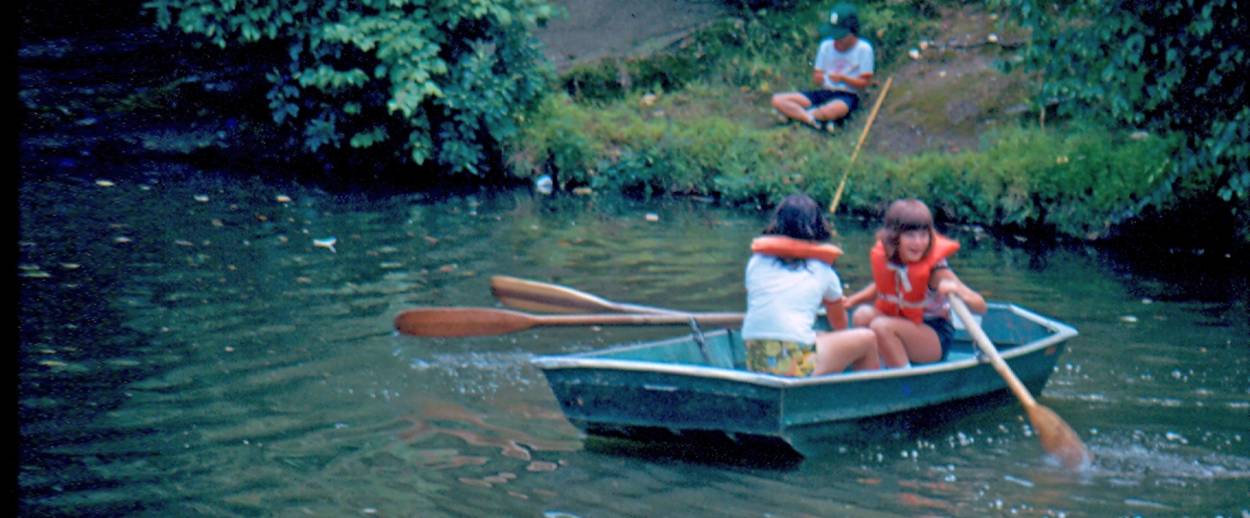
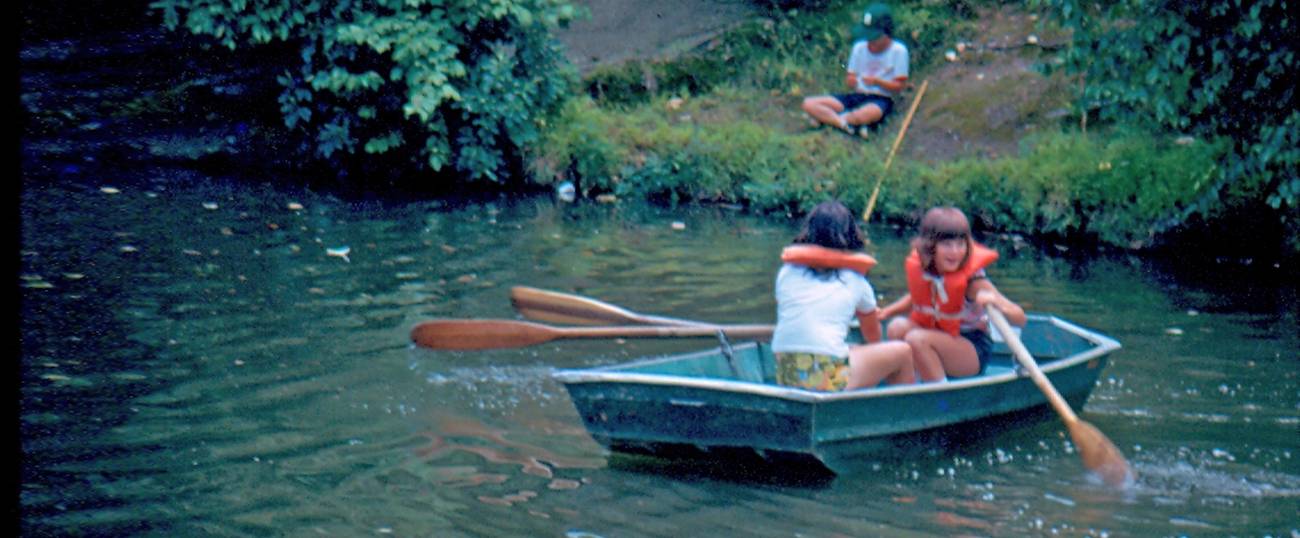


My wife is Jewish and I am not, so I know a few things. I know that the Talmud says you shouldn’t eat like a dog in the marketplace. I know that the national bird of Israel is the hoopoe, and that Shimon Peres named himself after a nest of bearded vultures he saw in the Negev desert in 1945. I know that, when all is said and done, Jewish mothers are no more guilt-tripping than the other mothers of the world, and that the secret to an edible Hillel sandwich is way more horseradish than you might think. With all of this random information accruing over nearly 20 years with my wife, I thought I knew something about what being Jewish means even though I am not Jewish. Then my wife and I started looking into summer camps for our son and I realized I know next to nothing.
As we flipped through the bundle of brochures my wife had gathered from booths set up in the gym at the Jewish Community Centre in downtown Toronto, I pointed out the only camp I knew. I knew it because several of our writer-type friends had gone there.
Sarah scrunched her face up like a squirrel’s. I had no idea what it meant but I knew it meant our son wasn’t going to the camp I knew.
“OK. So what about Kadima?” A woman I had met at my son’s skating lessons told me she sent her kids to Kadima, and she had seemed sensible enough.
“You want to fly out to Nova Scotia for visitors day?”
The woman at the skating lessons had obviously not been sensible.
I liked the look of one camp that claimed the leaders of the Warsaw Uprising among its former campers. That’s what you call strong alumni.
“All they do is write letters for Amnesty International and sit around talking about their feelings about Gaza.”
There were camps divided by religion: Orthodox, Conservative, Reform. There were left and right camps, and way-left camps and way-right camps. There were camps where a summer’s enrollment cost significantly more than the tuition at the best university in the country (Canada, obviously), and there were camps run like charities. There were camps that were Jewish in the sense that they were mostly attended by Jewish kids but had no Jewish content whatsoever. There were camps where the children of strivers went to show the children of other strivers their new phones; there were other camps where rich kids painted the walls of the cabins themselves out of some notion of character-building through self-reliance. The mixture of class and class-aesthetic with religious and political identities was bewildering. Not being Jewish, I had not been to Jewish camp myself and so I did not have my own camp experience to recreate or to resist vicariously.
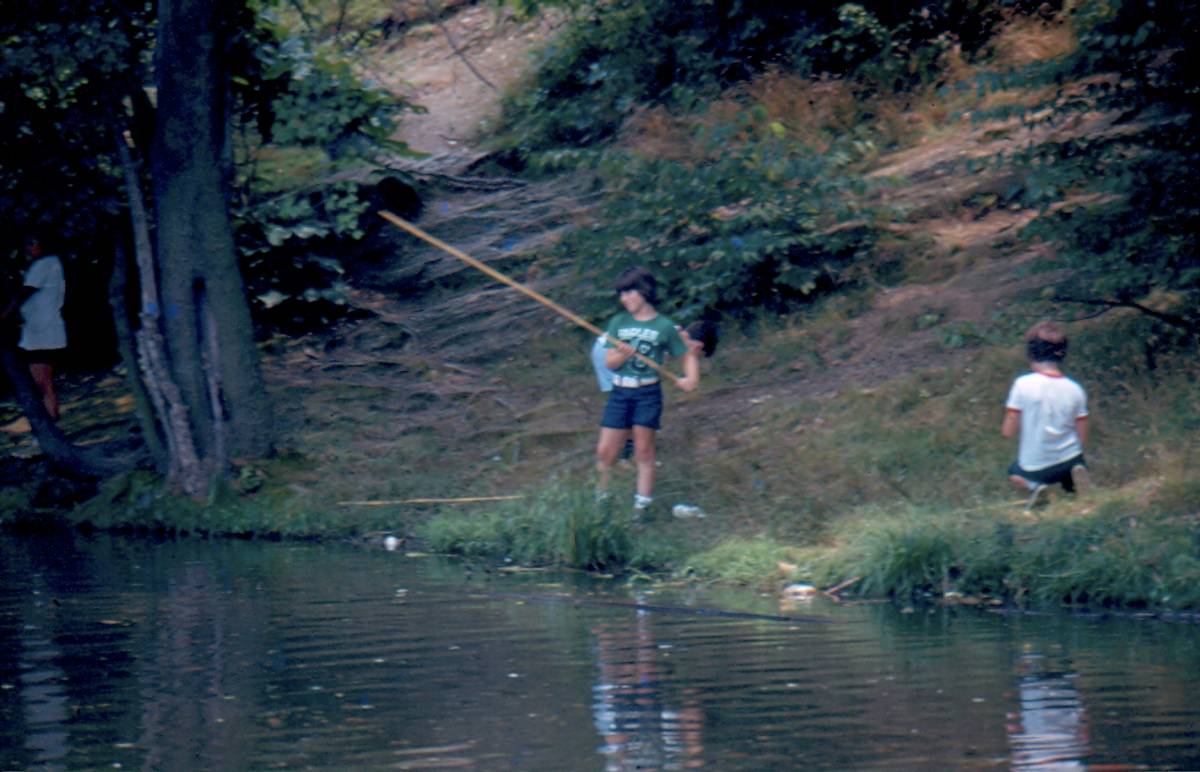
But that’s not entirely accurate; I had in fact been to Jewish camp. The summer after I met my wife, between my second and third years of college, I worked as a cook in a Jewish children’s camp outside Edmonton, Alberta, in Western Canada. My first memory of the job was the sight of my own feces coiled on a newspaper in my parents’ bathroom. The employers hadn’t asked for an interview or a résumé, just a stool sample to fulfill the requirements of the health regulations. One so rarely looks, with any real attention, at one’s own feces. I scanned my shit like I was searching out typos in a cover letter: Would it pass muster? The stool sample was a rather broad hint that working as a cook at a summer camp would be, literally, metaphorically, and in all other ways, a shit job.
My introduction to Judaism, like so many of the goyish sides of mixed marriages, was post-coital. When we first met, I was 19 and my wife was 20. She was playing the cello in the corner of a party, and I did not particularly care about her other cultural practices. Through the haze of two weeks in bed, a few tidbits of Judaica slipped through. She wore a star of David around her neck. At the diner breakfasts we ate in the mornings, she passed her portion of bacon over to me. I remember, in her bedroom, on the bookshelf, the first siddur I ever saw, a gorgeous worn blue-and-gold thing. Hebrew letters have always possessed an erotic association for me. The Cyrillic alphabet is majestic, the Greek alphabet unthinkingly elegant, but the Hebraic alphabet has a certain zaftig curvaceousness to it, an alphabet that has eaten its kasha and bows. Still, it was no big deal. It was kind of cool that I was dating a Jewish girl, nothing more.
It was much the same with the camp. After my feces had apparently passed whatever tests they put it through, and I was riding the Greyhound into the country, carrying Derrida’s Margins of Philosophy with me to read in preparation for a course in September, the Jewishness of the camp was a source of mild curiosity, like a drug I hadn’t tried yet. As a cosmopolitan Edmontonian, I considered the rural hinterlands where the camp was situated to be slightly scary. Ten years earlier the mayor of a nearby small town called Eckville had been discovered teaching his high-school social studies class that the Holocaust didn’t happen and that the Jews were “money-loving” “power hungry” “child killers.” Certainly if you wanted to find members of the Aryan nations, rural Alberta was a place to go. There was something verging on courage in plopping a Jewish camp down there.
Chad, my boss, was a local who had worked his way up to kitchen manager over a decade. He gave me the tour of where I would be spending the rest of the summer with appropriate boredom: The ovens heated things, the grill was for grilling, the break room was for breaks, the storage room was for storage.
“No snacks,” he declared. “That’s my one rule.”
“No snacks. Got it.”
“It’s like bears, man. If you feed the kids, other than what we feed them, they will come back and they’ll bring their friends and those little bastards will bite.”
I would later come to see Chad’s wisdom. No one would eat what we served if another option was a bowl of cereal later.
“Now, I’m not saying if some cute little counselor comes along, fresh from the lake, with her bikini top on and asks for a banana, you can’t give it to her.”
“Right.”
“Cause the Jewish chicks …”
“I’m dating a Jewish girl, actually.”
Chad looked at me as if I amounted to something. The details of the kitchen machinery faded to inconsequence.
“You’re fucking a Jewish girl? How did you manage that?”
I hadn’t looked at it as an accomplishment before. Chad seemed less impressed when he found out we had met at university. What was I doing in the kitchen of a children’s camp if I was at university? A fair question.
“Jewish girls are the best in bed, aren’t they?” Chad asked.
I was a gentleman, and a liberal; I had to agree.
In the back of the kitchen, the staff slept in a small broken-down cabin, stacked with bunk beds. The slats of the bunk beds had the grayish grime of a building not lived in for 10 months of the year. The brutality of the Alberta climate—it was not unusual for snow to fall every month of the year—had scoured the interior. The shack’s one window had a smashed pane. I asked Chad about it. Someone was coming to fix it right?
“I’ll look into it,” he said, dubiously, as if since I was at university I should probably know how to fix my own window. Out the broken window, I could catch, just barely, a sliver of the lake and the dock where the counselors were greeting each other after a year apart. I realized I wasn’t going to learn much about Jews this summer. They were out there. I was in here.
Instead I learned about Alberta. The crew with which I worked was as representative of Alberta—roughly speaking the Texas of Canada—as any group I’ve known. They were the typical mélange of expropriation economies. I have changed all their names because I can’t remember them now. There was James, 6-foot-4, Cree, maybe 23. There was Rosa, the daughter of migrant Mexican farmworkers, who always wore makeup because she was working inside, a source of pride for her. There was Mandy, Chad’s 16-year-old sister, who, even though I spent every day of two months with her, has left me without a single memory other than that her favorite singer of all time was Shania Twain. And then there was Tom, who was small and dull and never spoke. He had the sad soft eyes of a beaten dog, and a little body like he’d been raised in a dark box. His IQ scores would, I imagine, put him on the edge of mental retardation. We were all very gentle with Tom.
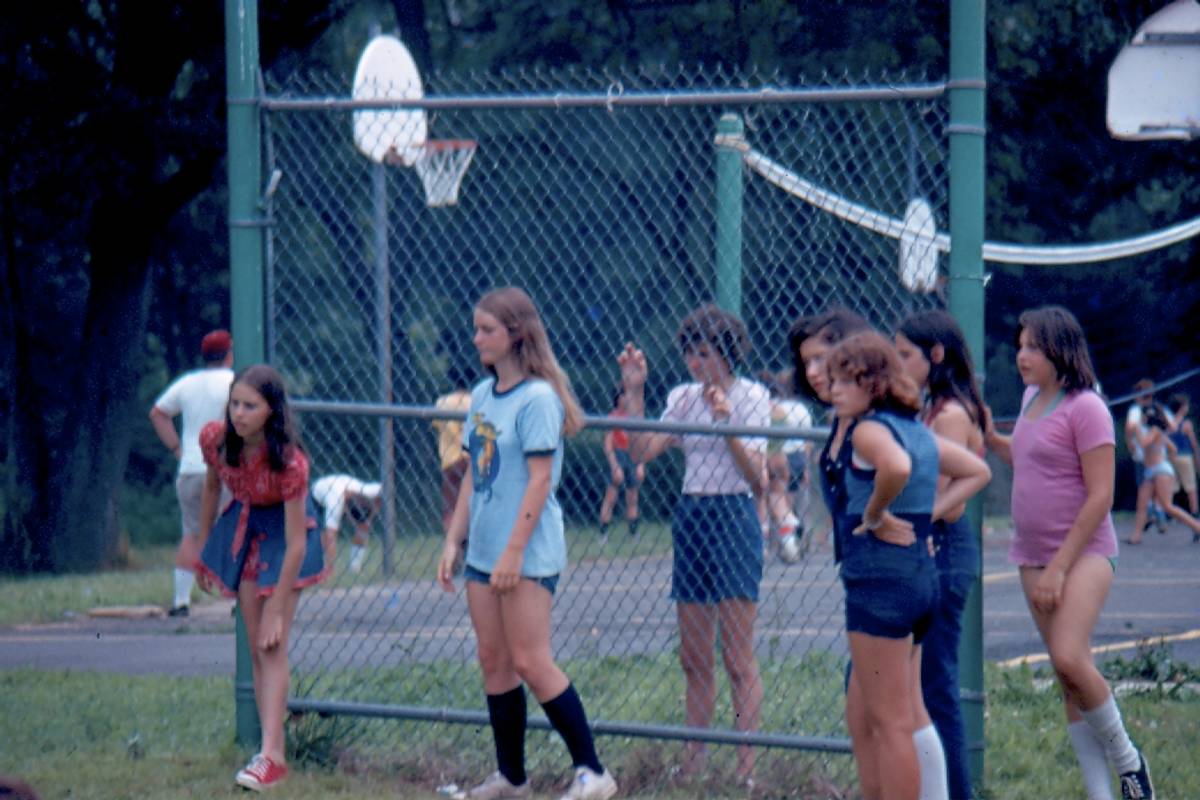
Chad trained us for a couple of days but soon left the day-to-day running of the kitchen to James, who had worked in the prison kitchen. James and I instantly became friends, in that automatic communion that sometimes happens between young men, even though I was a scholarship student in French philosophy and he was an Indian kid who had just left prison. He reminded me of a cousin with whom I had spent my childhood summers at my grandparents’ New Brunswick homestead, boxing and walking through mossy rivers trying to hand-fish trout.
James was proud of being a cook. This was, of course, well before Kitchen Confidential, the book responsible for convincing the world that anyone with tattoos working a line was the equivalent of a hard-working player in a touring rock band. James was proud to be skilled labor.
“What’s the most dangerous workplace in the world?” he opined in one of the first sessions he held designed to train me up as a cook.
I had recently read an article on this subject in the New York Times.
“Lumberjack,” I said.
“Nope. Guess again.”
I thought about it again. “Fireman? Police? Toxic-waste management?”
James couldn’t believe how stupid I was being me, with all my edumacation.
“The kitchen, man. Cooks. Look around you. There’s knives. There’s fire. There’s whirring machines.”
I demurred that such a correlation did not imply causation but James had his own logical system that operated on the following premises. 1) Truth can be derived from one’s immediate surroundings and personal experience. 2) Any objection could be waved away with simple contradiction.
In no way should our kitchen work at Maple Lake be confused with culinary activity. Nobody makes 500 grilled cheese sandwiches in an hour while caring about the people who will eat them. Technically, you could argue it was the preparation of food, but it was in no way meaningfully distinguishable from moving furniture. Three times a days waves of children crashed into the dining hall, fresh from canoeing or playing soccer or imitating the IDF, vessels needing to be filled. Their enjoyment was a matter of supreme indifference.
The camp advertised itself as “kosher-style” which meant “we’ll try our best but please don’t bring a rabbi.” The basic rules were easy: milk was the blue team, meat was the pink team, and parve played for nobody. The meals were predetermined by forces far above us, so we never had to worry about planning or purchasing kosher food. Whenever the milk plates touched the meat plates we would put them aside, as instructed. Chad told us that a rabbi had to bury them all to purify them. I’m pretty sure he just tucked them back without saying anything. Mercifully no rabbi ever showed up to test us. It was a Jewish camp, that much we knew. But Judaism, as we experienced it from the kitchen, was a series of minuscule, inexplicable regulations, which we accepted because they were there to be accepted.
The irony was obvious: While a collection of goyim learned the cruder points of kashrut, outside a bunch of Jewish kids paddled about in canoes. We were thinking about the Jewish rules. They were being Canadian to the point of parody.
James taught me how to use a knife without cutting myself, for which I am genuinely grateful. He taught me on a red pepper, holding my hands in his hands, standing behind me, too close behind me, with his arms under my arms, his hands on my hands on the knife.
“Don’t be the blade,” he said. “Be the pepper.”
“What does that mean?”
He made my right hand cut up and down unthinkingly like a sewing machine, and curled the fingers of my left hand in a half-circle to push the pepper through the path of the chopping knife. It took me a week to learn. I have not cut myself with a knife since. After a week, James was impressed.
“You got good speed. Look at that knife. It’s going up and down like a whore’s shorts on payday.”
That was another reason I loved James. He had that same earthiness of expression that my grandfather and uncles had, those rural Canadian expressions I so adore. “It sure does rains a pour”—my grandmother’s description of a thick rain. “Jim couldn’t parboil shit for a tramp”—my grandfather on the poor cooking skills of my uncle. “She sure is beef to the heels”—my great uncle Mariner describing a woman with curves.
The community of the kitchen workers was instant. We worked together 12 to 14 hours a day. All of us played poker in the evenings after dinner, a local variant, “Deuces and Jacks and the man with the ax and a pair of natural sevens takes it all.” If Texas Hold’em is the Cadillac of Poker, then the poker we played was a busted-up Vespa. The huge number of wild cards meant that nearly every hand ended with four aces over four kings, or similar nonsense.
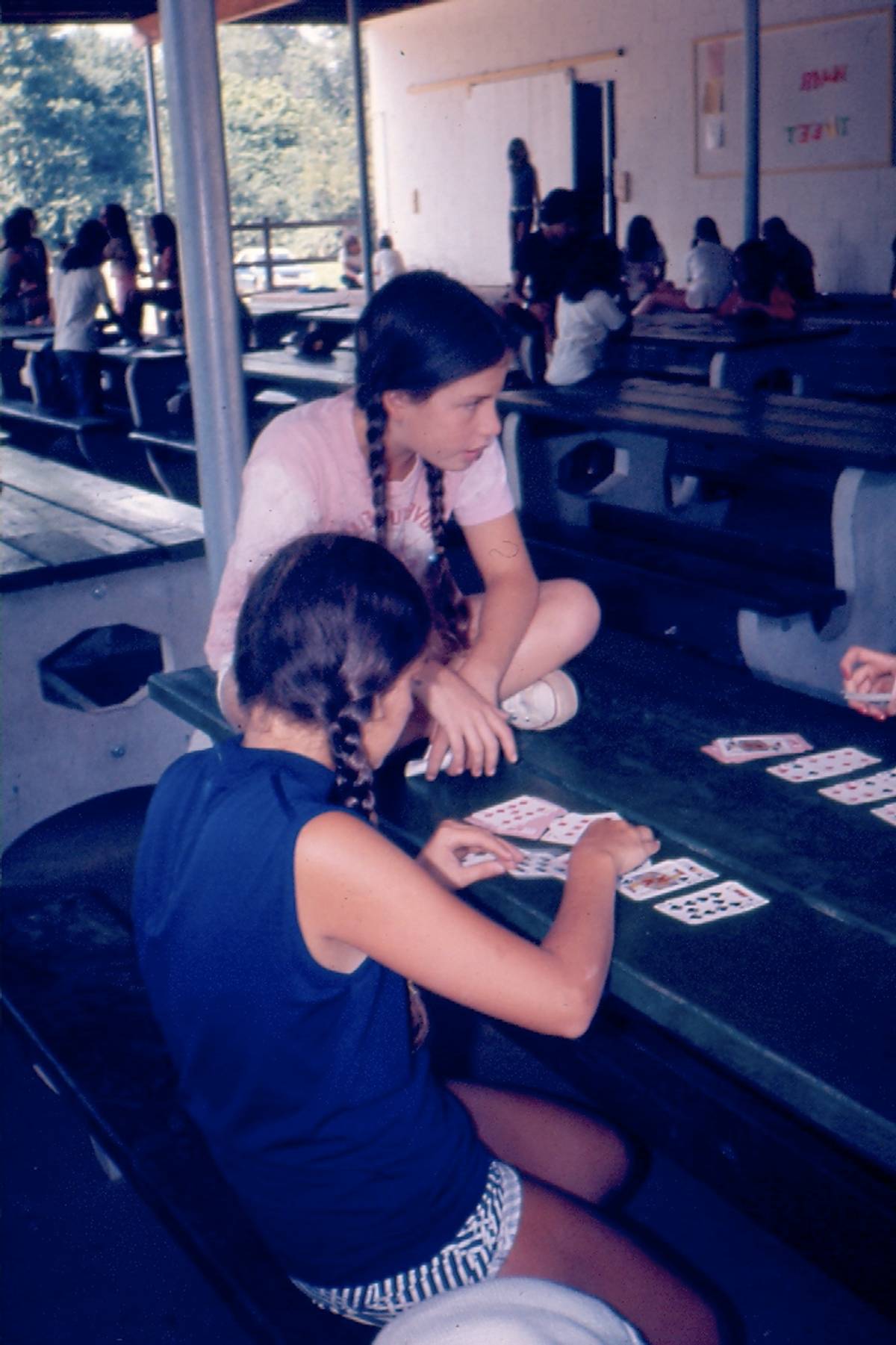
Dull little Tom told us about his uncle who worked on the oilrigs and had found out that his contract stipulated a set price for every possible industrial accident and that a pinkie finger was worth five hundred bucks, and he needed five hundred bucks for the down payment on a truck, so the next morning he stuck his pinkie in the throwing chains, but it chewed up his whole arm instead, which was worth more than five hundred bucks, but even a great truck wasn’t worth a whole arm. We all told Tom it was a very interesting story and that he had told it very well, and he looked proud.
In a game early in the summer I took three cartons off poor dumb Tom. We both had hands that were four wild cards and an ace. He said he had five aces. I explained that I had a straight flush and that straight flushes beat five aces. He looked doubtful. I insisted. He knew I was smarter than he. So, he shook his head sadly; he was inured to losing when he couldn’t do anything but win.
“Poor Tom,” James said. “He couldn’t get laid in a bucket of dicks.”
Rosa recounted a continuous stream of sexual escapades mostly involving cowboys and mostly for the benefit of eager-eared 16-year old Mandy. Mandy was a poor audience insofar as she came from a family with real cowboys in it and therefore knew that real cowboys smell like sweat and shit and drink themselves into one situation after another until they die pathetically. For young women, and for everybody else, a happy life is lived as far away from cowboys as possible. Still, Rosa’s vast erotic imagination worked miracles of variety out of this sole sexual trope.
James told us about prison. He had been in for assault, a bar fight gone awry, or so he claimed. I was skeptical myself, at least at first, but he did have details about prison life that I’ve never seen on television or the movies.
“The one word you never say in prison, Steve, is goof.”
He was so used to instructing me about how to become a good cook that when we discussed prison, it were as though I was going. I didn’t have the heart to explain to him that I was white and educated and nervous about causing minor embarrassments and not interested in the financial industry, so the chances I would need his prison instructions were slim.
“Goof?”
“You never say that word. Anything else is fine. Call a guy a motherfucker, it’s fine. He can never take goof even as a joke. ‘Ah, you fucking goof.’ Never say that, Steve.”
“So, if I were to call you a goof …”
“Don’t. I’d have to kill you.”
“But we’re not in prison and prison is where you can’t say …”
“Don’t say it …”
“Goof.”
And here he rushed me and tried to wrestle me—he was always trying to roughhouse—but I slipped away and kept slipping away as he kept trying to wrestle.
“In prison, nobody wrestled,” he said after he had stopped trying.
“Knife fights?”
“Other things.”
I also learned that the key to making really good pruno is ketchup. Ketchup is the gasoline in the engine for stewed prison alcohol, apparently.
After a week, Chad only showed up in the kitchen to give snacks to cute counselors fresh from the lake. He would wink at me, worldly by the standards of his people, which were the bungalow-dwellers of Red Deer, but he was so mild in his flirting that none of the nice Jewish counselors even noticed. And besides, the whole point of the camp, as was immediately obvious to anyone who had ever seen Jewish people outside of the context of the camp, was for nice Jewish boys and nice Jewish girls to have no other sexual object but each other for a couple of months a year. Nobody was going to fuck the kitchen manager. That’s not a fun story to tell when you get back to school.
I figured out later that Chad’s sexual taste for Jewish women was born out of wish-fulfillment. He had worked his way up at the camp kitchen over his entire youth and had spent all the meaningful summers of his life surrounded by teenage girls frolicking in the wilderness while he labored. The attribute attached to these frolicking women was “Jewish.” His philo-Semitism was Pavlovian. He longed to be on the other side of the line that divided kitchen from camp.
I was more confused: Which side should I be on? The whole time, as I grilled hamburgers or washed dishes or emptied the grease traps, I knew I belonged out there. I knew I should be with the Jewish kids, in the light of easy privilege that fell so casually on their shoulders. I was a scholarship student with a Jewish girlfriend. I was not a roughneck. Couldn’t they see that?
The Jewish kids I did end up meeting were a self-selected group though a broad one: They were the kids who smoked pot. The kitchen controlled the materials, the food and the marijuana. You know when people say that “pot isn’t what it used to be”? I was there at the exact moment when the new pot arrived. It was 1994. In 1993, pot was called pot, and there was good pot and bad pot, buds and stems. In 1995, pot started having names, names like “The Antichrist” and “Blueberry Nuclear.” Alberta was always on the cutting edge of drugs, since the oil patch was burning with money—the hundred-dollar-an-hour roughnecks blew their hastily accrued wealth on smashed trucks and hookers and steak and lobster and cocaine, and also the best available marijuana, the innovative stuff. After smoking it, and we smoked it all day every day, for morning to night, I saw wolves running in the dark woods on the path to the lake. I saw lights where there were no lights. Later, I talked to a drug dealer of my acquaintance, wondering if it had been PCP or something like that. Nothing so glamorous, he suggested. Probably embalming fluid.
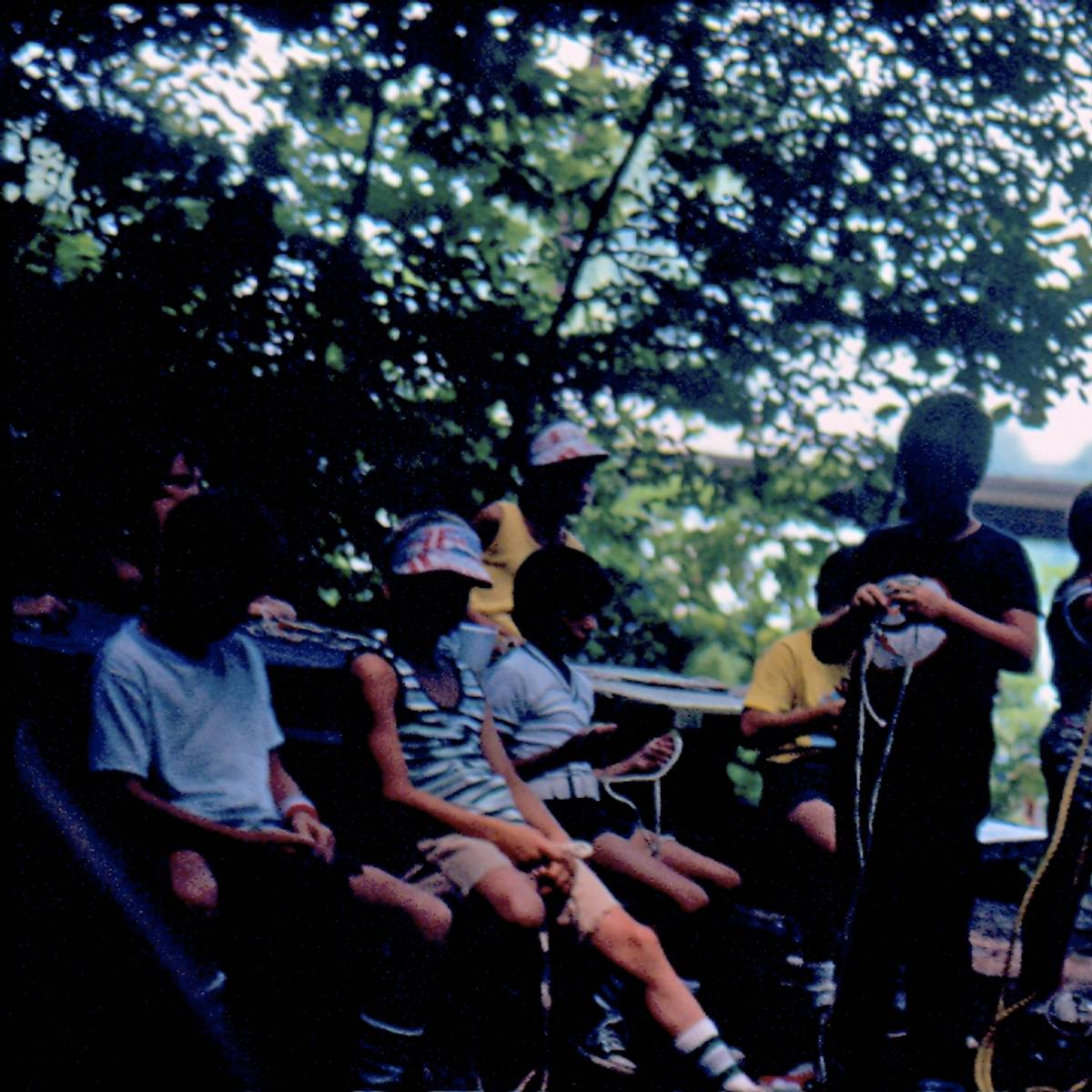
The good pot brought camp counselors the way that rotten chicken brings raccoons. Unfortunately, the pot-smokers were disappointingly typical. There was the standard contingent of mid-nineties neo-hippies, the kind who had listened to Little Earthquakes maybe one too many times and had the Hebrew letters for HaShem tattooed over their hearts in a misguided attempt at Jewish pride. But mostly they were the dumb sons and daughters of dentists, for whom the back room of the kitchen at camp represented an encounter with the illicit. There were also the socially conscious lefties, who hung out with the kitchen staff to prove to themselves that they were comfortable with workers, “among the people.” I despised them most of all. But they brought gossip at least. In the telling of the other counselors, the camp was a gigantic sex farce—doors opening, doors closing, assignations in the boat shed. We listened, below stairs, to these stories of our betters with childish pleasure.
A few of the counselors smoked enough pot to become friends. There was Rich, the tanned guy with who ran the boats and who, I believe, if memory serves, actually wore a sweater knotted around his shoulders. He was a man with a certain noblesse oblige. He liked to take the kitchen staff out on the lake at night, just for the sheer pleasure it gave us all to be away from the tiny enclosed circle of our labor.
The lakes of Alberta are not the province’s strongest natural beauties—not compared to the Rockies, or to the tundra to the North, or to the foothills. But the sky, in its terrible immensity, is the most beautiful thing in the world. And we sat out as long as we could, silent, high, young, exhausted, on a still boat far away from the needs of Jewish kids, under that star-streaked sky.
“This is it,” Rich said.
“What is what?” I asked. The others were too stoned to ask.
“It,” he answered expansively. And I knew what he meant. He was running a boat, in a camp full of teenagers who all wanted to sleep with him, in the Alberta that he loved. There was little more he could ask from life. He was happy to share his happiness.
The other counselors would come in on our breaks, to join us in a morning bowl, and I would casually mention that I went to college, that I had been dating a Jewish girl before I came to this godforsaken realm of grilled cheeses and roast chicken, and they would stare blankly. The whole point of a Jewish camp was that I wasn’t like them. That is, after all, why people send their kids to Jewish camp, to give them a sense of Jewish community. And a part of any community is exclusion. My role was not to be one of them but to be somebody other.
I retreated into my various privacies, as I usually do. My coworkers weren’t surprised by my reading Margins of Philosophy; they were surprised by the fact that I had brought a book at all. It was somewhat silly, trying to make sense of post-structuralism in between “deuces and jacks and the man with the ax, and a pair of natural sevens takes it all” and the pot and 12 hours of work a day.
Chad caught me once, as he was coming into the kitchen to make a bikinied counselor a peanut butter sandwich. “Is that a book there?” he asked incredulously.
“Margins of Philosophy, by Jacques Derrida,” I answered.
“I read a book once,” Chad said. “It was called One Flew Over the Cuckoo’s Nest. I loved it.”
“Did you ever try reading another one?” I asked.
“I liked it so much I couldn’t figure out why I would read something else. Still, books are great.”
Later I discovered that Chad and David Freeman-Mitford, 2nd Baron Redesdale, the father of the Mitford sisters, shared this same literary foible. “My dear Lady Kroesig, I have only read one book in my life, and that is ‘White Fang.’ It’s so frightfully good I’ve never bothered to read another.” So Nancy Mitford remembered him saying in The Pursuit of Love.
The rare moments I did manage to steal for reading were precious. I would sit on a busted car seat beside the path to the lake in a kind of accidental junkyard that had accumulated there. But somebody was always interrupting.
“Goof.” It was James. I had spent enough time with James to realize the need for clarity about my feelings and goals.
“I’m reading. I want to be left alone.”
“Goof,” he smiled. “You going to take me calling you goof?”
“I honestly don’t care.”
He wrestled me anyway. He gripped me from the back and hurled me off the busted car seat into the dusty space in the junkyard. Before I could slither away, he pressed me down and I pushed up, catching him accidentally with my elbow on the nose. His blood sprayed on the dust. He rolled off, stanching it with his fingers. I resumed my seat and picked up the book again.
“Fuck off, James.”
He looked at the blood on his fingertips. “Good thing you didn’t call me goof.”
The food we cooked tasted of boredom and exhaustion but there was a break from our lousiness: the challah. The challah was our redemption. After a week of chili and frozen fish, on Friday we presented the camp with freshly made egg-bread, soft and warm, straight from the oven. The challah was a camp recipe; the yeast had been brought by a camp founder’s Russian ancestor. The counselors remembered this challah from their days as campers; the campers looked forward to it all week. And now that I have sampled challah from Tel Aviv and Jerusalem and Montreal and New York and elsewhere I can say with some mild authority that the challah was genuinely delicious, chewy and a bit sweet and with enough tension in the braids to contain the lightness of the yeast. A lapsed Orthodox friend later explained why the “kosher-style” challah we were making tasted so much sweeter than what you could buy in the Crown Heights bakeries. Among the Orthodox, the prayer for cake is different than the prayer for bread, so to ensure the bread is not cake there is no sweetness. I take their point: Our challah was somewhere in between cake and bread.
Because it was double-rising, the challah took 20 hours to make. You had to mix the ingredients, let the mixture rise, then mix them again, let the mixture rise again, and then braid the loaves and bake them. I always volunteered for the job of staying up because Chad let whoever baked the challah sleep in the whole of Saturday. Plus he gave out a pile of free weed. All in all, a fair exchange. Besides, the summer nights on the prairie, with their delicate rustling of dry grasses and their warmth glowing from the sun-drenched dirt, can be cosmically gorgeous.
Toward the end of the summer, James volunteered to bake the challah with me and after the second mixing, while the dough was rising, we strolled down to the dock to share one of the huge joints I had become adept at rolling, using a staggered pattern of nine papers, to create a perfect cone, a blunt avant le lettre.
“Most kitchens are all men,” James noted, apropos of nothing, leaning in to take the joint from my fingers.
The pot was heightening more than mellowing. The darkness of the lake was imposing, and I could sense how much larger James was than myself. “I think that’s just prison,” I said.
“No, no, most cooks are men. Men with other men.”
Pot does make me paranoid, like in the comedies. But I thought I could feel, really, the side of James’s thigh against mine. Was it pushing against me? Then I thought I saw lights stirring on the dark waters.
“There’s a kind of thing that happens between men and other men,” James said, leaning in. There lay the coiled strength of his arm against my arm.
Out in the water, a canoe was slicing through the lake darkness toward us. It wasn’t the pot either. A dozen other canoes were paddling in its wake. The Aryan nations? The Holocaust-denying high-school teacher who lived around the corner? Who else would be paddling up to a Jewish camp at four in the morning? James and I found Chad who found the camp director who found the counselors who found the sports equipment storehouse and ran down to the docks. By the time the canoes had pulled up to the dock, 25 Jewish guys and two non-Jewish guys were waiting for them with baseball bats.
They were not the Aryan nations. They were representatives of the Christian camp on the other side of the lake, who had come to hang a banner on the docks announcing their plan to sing a song of fellowship across the water in the morning.
I made sure I was never alone with James again for the rest of the summer, the ending of which was as sudden as the beginning. The last day required breakfast for the counselors tasked with putting away the camp for the winter. We fed them. We cleaned the kitchen. We smoked a final communal joint. Then we caught buses to elsewhere. I never saw any of my camp colleagues again. This was 1994; the last summer nobody had an email address. It wouldn’t have mattered anyway. Our intimacy was profound but circumstantial; once the work disappeared our friendships evaporated with them.
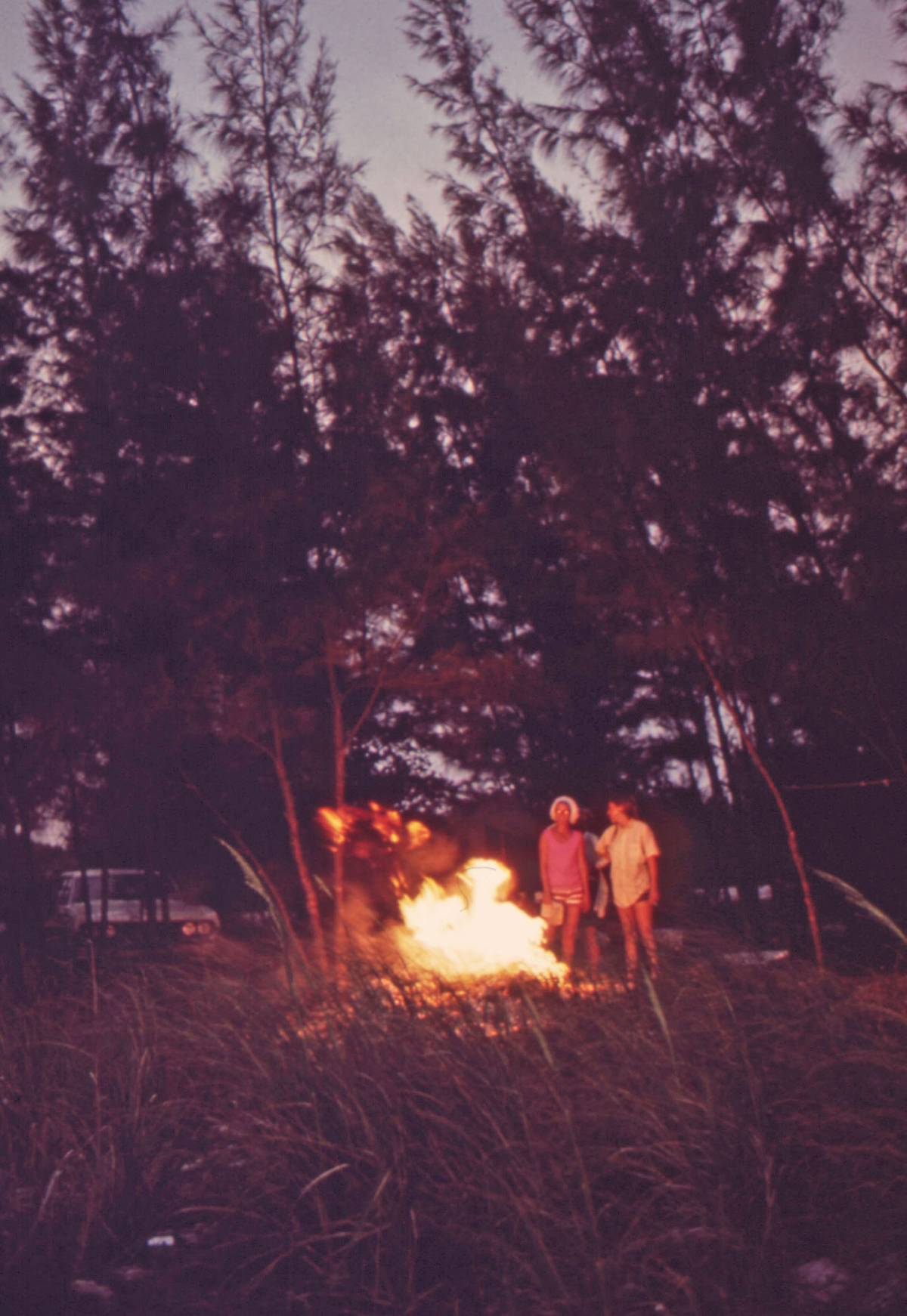
My future wife was pleased to see what the camp had done to me. My shoulders were twice the size they had been, and my peasant roots, so long suppressed, finally revealed what my body was supposed to become when used to design specifications. In the spring, she had signed on for a bookish weed. In the fall, she met up with a brute who could bake a decent challah. (I finished Margins of Philosophy in her bed.) As for spiritual growth, there was none. If I learned anything, anything other than how to use a knife properly, it was that I hate work. Walter Benjamin wrote that there is no document of civilization which is not at the same time a document of barbarism. He believed this fact was the sacred possession of historical materialists. But everyone who has ever worked in a kitchen knows it, too. I made sure I never had to do real work again.
Recently I picked up my copy of Margins of Philosophy. Inside was a folded piece of the lining from the packs of Du Maurier cigarettes that I used as bookmarks that summer. That little folded piece of silver wrapping, still smelling cheaply of raisins, from a pack of smokes I tricked some poor half-handicapped kid out of, was tucked inside a page that read:
Are we to take the question of the truth of Being as the last sleeping shudder of the superior man? Are we to understand the eve as the guard mounted around the house or as the awakening to the day that is coming, at whose eve we are? Is there an economy of the eve?
Perhaps we are between these two eves, which are also two ends of man. But who, we?
That little bit of soiled silver packaging is me.
Several years after that summer at camp, I was sitting in Tmol Shilshom, a Jerusalem café where Yehuda Amichai reportedly dropped by on a regular basis. I didn’t end up meeting the great poet I was stalking there. Instead I ran into a counselor. I remembered her mainly because she had come into the kitchen one morning and asked me if I could make her a smoothie and I had laughed and she looked peeved. I had been an affront to her life, in which people made smoothies for her in the same way that the lights turned on when she flicked a switch.
“You’re from Alberta, aren’t you?” I asked.
She looked at me with alarm.
“Yeah. I am. Where do I know you from?”
I could see the light behind her eyes flickering, searching the database of Jewish geography, failing to register.
“I worked at the camp,” I offered.
This only added to the confusion. The camp was like her family. And I was not her family. Yet I was in Jerusalem.
“I’m sorry,” she said, “but you must have me confused with another person.”
Of course she didn’t know who I was. I had seen her but she had never seen me. How could she?
In the end, my wife picked a B’nai Brith camp for our son. It looks fine to me, but what do I know? I wrote the check and didn’t ask for explanations. To be honest, I never doubted he was going. I would like my son’s childhood memories of his Jewishness to be cheerful, to smell like Canadian lakes and five hundred grilled cheese sandwiches. My wife will have to drop the boy off, though. I don’t want to look in the kitchen.
Stephen Marche is an Esquire columnist and the author, most recently, ofThe Hunger of the Wolf.